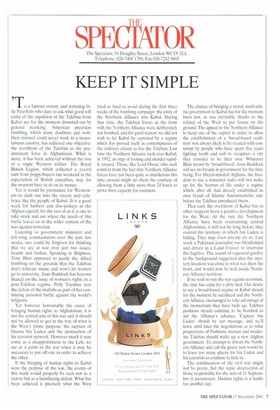SPECtATOR
The Spectator, 56 Doughty Street, London WCIN 2LL Telephone: 020-7405 1706: Fax 020-7242 0603
KEEP IT SIMPLE
Tis a famous victory, and irritating little Peterkins who dare to ask what good will come of the expulsion of the Taleban from Kabul are for the moment drowned out by general rejoicing. American precision bombing, which many doubters and wobbiers insisted could never work in a mountainous country, has achieved one objective: the overthrow of the Taleban as the predominant force in Afghanistan. What is more, it has been achieved without the loss of a single Western soldier. The Royal British Legion, which collected a record sum from poppy-buyers last weekend in the expectation of British casualties, may for the moment have to sit on its money.
Yet it would be premature for Westerners to dash out into the streets and celebrate like the people of Kabul. It is a good week for barbers and disc-jockeys in the Afghan capital; for the rest of us it is one to take stock and ask where the result of this battle leaves us in the wider context of the war against terrorism.
Listening to government ministers and left-wing commentators over the past few weeks, one could be forgiven for thinking that we are at war over just two issues: beards and burkas. Speaking in Brighton, Tony Blair appeared to justify the Allied bombing on the grounds that the Taleban don't tolerate music and won't let women go to university. Joan Ruddock has become fixated on the issue of women's rights in a post-Taleban regime. Polly Toynbee sees the defeat of the mullahs as part of her continuing personal battle against the world's religions.
Yet however honourable the cause of bringing human rights to Afghanistan, it is not the central aim of this war and it should not be allowed to get in the way of what is the West's prime purpose: the capture of Osama bin Laden and the destruction of his terrorist network. However much it may come as a disappointment to the Left, we are at a point in the war when it may be necessary to put off one in order to achieve the other.
If the bringing of human rights to Kabul were the purpose of the war, the events of this week would properly be seen not as a victory but as a humiliating defeat. What has been achieved is precisely what the West tried so hard to avoid during the first three weeks of the bombing campaign: the entry of the Northern Alliance into Kabul. During that time, the Taleban forces at the front with the Northern Alliance were deliberately not bombed, and for good reason: we did not wish to let Kabul be captured by a regime which has proved itself as contemptuous of the ordinary citizen as has the Taleban. Last time the Northern Alliance took over Kabul, in 1992, an orgy of looting and murder rapidly ensued. Those, like Lord Owen, who seek comfort from the fact that Northern Alliance forces have not been quite so murderous this time around might do them the courtesy of allowing them a little more than 24 hours to prove their capacity for nastiness.
The chance of bringing a moral, multi-ethnic government to Kabul has for the moment been lost, as was inevitable thanks to the refusal of the West to put forces on the ground. The appeal to the Northern Alliance to keep out of the capital in order to allow the establishment of a 'broad-based coalition' was always likely to be treated with contempt by people who have spent five years fighting tooth and nail to recapture a city they consider to be their own. Whatever Blair meant by 'broad-based', Joan Ruddock will see no broads in government for the time being. For liberal-minded Afghans, the freedom to use a transistor radio will not make up for the horrors of life under a regime which, after all, had already established its own brand of Islamic fundamentalist rule before the Taleban introduced theirs.
That said, the overthrow of Kabul has in other respects been a positive development for the West. At the rate the Northern Alliance have been overrunning central Afghanistan, it will not be long before they control the territory in which bin Laden is hiding. They may even already do so. Last week a Pakistani journalist was blindfolded and driven in a Land Cruiser to interview the fugitive. The sound of repeated gunfire in the background suggested that the mystery location was close to what was then the front, and would now be well inside Northern Alliance territory.
If we wish to win the war against terrorism, the time has come for a dirty deal. Our desire to see a broad-based regime in Kabul should for the moment be sacrificed and the Northern Alliance encouraged to take advantage of the momentum they have built up. Taleban positions should continue to be bombed to aid the Alliance's advance. 'Capture bin Laden' should be our message, and we'll leave until later the negotiations as to what proportions of Pashtuns, women and moderate Taleban should make up a new Afghan government. To attempt to thwart the Northern Alliance and call the peace now would be to leave too many places for bin Laden and his terrorists to continue to hide in.
The continuation of the civil war might not be pretty, but the rapid destruction of those responsible for the acts of 11 September is paramount. Human rights is a battle for another day.






















































































 Previous page
Previous page